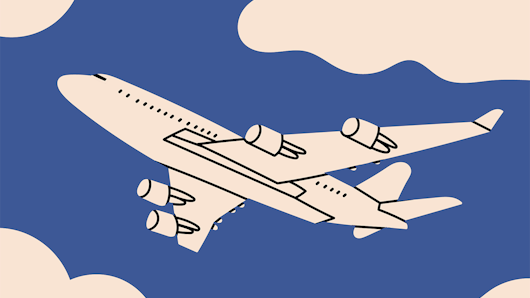
By Ruairi O'Shea
Former Investigative Writer | Kaituhi Mātoro
If you’ve looked at booking flights for a trip home or a holiday this Christmas, you’ve likely seen that prices have taken off.
Consumer NZ member Gloria got in touch last week to query the high price of flying this Christmas. Before the pandemic, Gloria’s daughter and granddaughter were used to paying about $1300 to fly from Brisbane to Wellington return. But in 2022, the same flights cost them almost $2500.
Gloria’s experience is not unique, and increased flight prices are not restricted to the festive period.
We can see how the price of flying has evolved over the last 5 years in the graph below, which shows the relationship between growth in flight prices and inflation. The consumer price index (CPI) is the primary way in which inflation is measured; when something increases more than CPI, it is getting more expensive than other goods and services, when it increases less than CPI, it is getting cheaper.
Growth in the price of air travel is driving - and outstripping - growth in inflation
Source: Stats NZ, 2022
Many of us have not seen far-flung family and friends for years due to border closures, and we’ve all got less money, so why are airlines charging us so much more?
The impact of the pandemic
Covid-19 has been particularly difficult for the aviation industry, with planes a hotbed for viral transmission. And when international borders were closed, airline businesses were severely affected.
This has driven prices up for two reasons, according to Brent Thomas, chief operating officer of House of Travel. The first reason is related to financial recovery and the second is related to supply and demand.
“The airlines had decimated their balance sheets over the two-year period where they couldn’t fly. They have to rebuild their cash position because it’s an industry where there’s a requirement to invest in significant assets a long time in advance. They need a good profit to do that.”
The pandemic has also had a significant impact on supply and demand of air travel.
“There’s an incredible amount of built-up demand,” Thomas said. “None of us in the industry were anticipating just how fast it came back.
“There’s been a lot of demand, but it’s very difficult to get supply back up. You need to bring the planes back in, to bring back staff and retrain them.
“High demand, low supply. It’s a perfect storm from a pricing point of view.”

Conflict in Europe
Three days before New Zealand began the phased reopening of its border, Russia invaded Ukraine. This caused significant disruption to the global supply of oil and gas. The world has shunned Russian oil, and OPEC (the Organization of the Petroleum Exporting Countries), which includes Russia, has reduced production. This has driven up prices.
This means New Zealand is experiencing levels of inflation not seen for decades, but we remain relatively insulated from the effects of the conflict. Speaking in February, Prime Minister Jacinda Ardern said New Zealand’s imports of Russian oil had traditionally represented about 20% of oil imports. For comparison, before the conflict, a third of Germany’s crude oil and more than half of its gas came from Russia. In Britain, the chief of the National Grid has announced that three-hour long blackouts may be imposed on cold weekday evenings.
While New Zealand’s domestic energy supply has been insulated from the impacts of the conflict, the price of jet fuel has not.
Across the 38 nations in the Organisation for Economic Co-operation and Development (OECD), inflation reached a 30-year high of 10.3% in June. By comparison, the price of jet fuel rose by 128%, more than doubling in just one year. The price of jet fuel has fallen slightly since its peak price in June, but it remains significantly higher than its pre-pandemic and pre-war level.
This, in addition to the high demand for travel, has had a significant impact on the cost of flying, according to Scott Carr, Air New Zealand’s general manager for long haul.
“Due to the rising and significant increase in fuel costs, combined with inflation impacts across all other components of our cost base, we have had to review our fares,” he told Consumer.
This has a significant impact for airlines, with the International Air Transport Association (IATA) reporting that jet fuel typically accounts for 20% to 25% of total operational costs, “causing unprecedented pressure in terms of cost management for the airline industry”.
Jetstar declined to comment for this story.
When will it end?
Thankfully, this is not likely to be a new normal, according to House of Travel’s Brent Thomas. The American carriers, and potentially the Chinese airlines, are set to resume flights to New Zealand, increasing capacity and competition. This will mean better choice, and better prices, for consumers, he said.
“Competition into North America will play out in 2023. Air New Zealand are now going to face competition from Qantas, who have already indicated that they’re going to fly to New York out of Auckland,” Thomas said.
“Out of Asia, we’re waiting to see what the Chinese carriers do. We’re hoping they will come back in 2023.”
This is good news for consumers, he said, because “competition does mean sharper pricing. That’s always been the case”.
This Christmas is a perfect storm, but will the storm have passed for next year’s festivities?
“I think we’re definitely going to see changes,” Thomas said. “We’ve got a number of carriers who’ve already got their slots organised. In 12 months’ time, we won’t be seeing the same position as we’re seeing at the end of 2022.” However, oil price uncertainty lingers.
How to get the best fare
“Our advice to customers is to book early to get the best possible fares,” says Air NZ’s Scott Carr.
“As an example, the lead-in fare for those booking early on an Air New Zealand domestic flight is between $59 and $99, depending on route. A lead-in fare with Air New Zealand from Auckland to Honolulu, for example, is $378.”
House of Travel’s Thomas agrees.
“Despite all the troubles in the world, we’ve been staggered by two things: the amount of bookings and how early people are booking. There are no guarantees in our industry, but it’s highly likely that you’ll get the best price by booking as early as you possibly can.”
So when should you start thinking about next Christmas?
“What I suggest is that people sit around at Christmas, work out what they want to do next year, so they can book as soon as possible,” Thomas said.
No excuse not to meet obligations
The pandemic and the conflict in Europe offer an explanation for higher prices, but they do not offer airlines an excuse to avoid their obligations to paying customers.
We’ve recently launched our Flight Rights petition. This is an initiative for airlines to communicate honestly with passengers about the reasons for cancellations and delays, and to clearly display passengers’ rights. The petition is well on its way to its target of 10,000 signatures and has prompted Air New Zealand to produce a guide for passengers affected by cancellations or delays.

Flight rights campaign
We’re calling for airlines to communicate honestly with passengers about the reason for cancellations and delays, and clearly display their rights.

